Prescription medications are designed to help with medical conditions, but some carry risks that are not always obvious to patients. Soma is one such drug. While it is prescribed for legitimate reasons, misuse can lead to serious health concerns, including addiction. Understanding what Soma is, how it works, and whether it can be addictive is important for anyone prescribed this medication or considering treatment for substance misuse.
What is Soma?
Soma is the brand name for carisoprodol, a prescription muscle relaxant. Doctors typically prescribe it to relieve muscle pain and discomfort caused by injuries, strains, or musculoskeletal conditions. It is usually intended for short-term use and is often paired with rest, physical therapy, or other treatments to manage pain.
Soma works by altering communication between nerves in the brain and spinal cord, which helps relax muscles and reduce discomfort.
How Soma is used
Doctors generally prescribe Soma for a few weeks at a time rather than for long-term use. This is because prolonged use increases the risk of dependency. Patients are advised to take Soma exactly as prescribed and not to combine it with alcohol or other sedating substances.
Is Soma addictive?
Yes, Soma can be addictive. While it may not be as widely recognized as opioids or benzodiazepines, Soma affects the central nervous system in ways that can produce feelings of relaxation or euphoria. These effects increase the risk of misuse.
Repeated misuse of Soma can lead to tolerance, meaning the body requires higher doses to feel the same effects. Dependence may also develop, making it difficult for someone to stop using Soma without experiencing withdrawal symptoms such as insomnia, anxiety, tremors, or irritability.
Risks of misuse
Misusing Soma can have harmful effects on both the body and mind. Potential risks include:
-
Drowsiness and dizziness that increase the risk of accidents
-
Impaired coordination and judgment
-
Memory problems or confusion
-
Dangerous interactions with alcohol or opioids
-
Risk of overdose when taken in large amounts or mixed with other substances
Because of these risks, Soma is classified as a controlled substance in the United States.
Treatment for Soma misuse
If misuse develops, professional treatment can help. Outpatient programs provide therapy, coping strategies, and education that address both the physical and psychological sides of substance misuse. At Summit Helps in Princeton, individuals can access outpatient treatment programs tailored to their unique needs while maintaining work, school, or family responsibilities.
Taking steps toward recovery
Soma can be a helpful short-term medication when used as prescribed, but its addictive potential should not be overlooked. If you or someone you know is misusing Soma, seeking help is a powerful first step. Summit Helps in New Jersey provides outpatient services to guide individuals toward recovery and healthier coping strategies, offering a safe path forward away from substance misuse.

